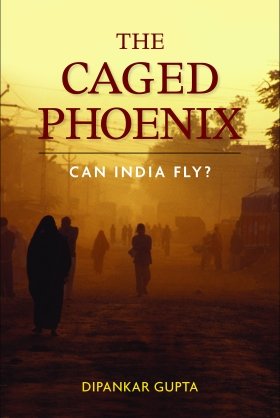The Caged Phoenix: Can India Fly?


-
Dipankar Gupta, one of India’s foremost thinkers on social and economic issues, takes a critical—and controversial—look at the limits of the Indian success story in The Caged Phoenix. Through a fine blend of theory and new evidence on small scale industries, farming, and more, Gupta argues that, despite the promise of independence and liberalization, India continues to remain caged in backwardness. In short, the country’s phenomenal growth story has not translated into development.
Questioning prevailing culture-based theories—and the academics who perpetuate them—that are used to explain India’s poverty and its hampered development, Gupta attempts to “normalize” India, advocating a rigorous rejection of justifications that rely upon cultural otherness and exoticization. He critically examines the reluctance to acknowledge that structural impediments, not cultural factors, deny growth benefits to the majority of Indians, and explores the close link between growth in high technology sectors of the Indian economy on one side and sweat shops and rural stagnation on the other. Making a comparison with the developed West, Gupta underscores the point that affluence can be achieved only after living conditions improve across all social classes.
Combining original scholarship with a lively narrative, Gupta debunks widespread myths about why India’s democracy has yet to deliver and offers compelling explanations for the paradoxes that exist.
Dipankar Gupta is Professor at the Centre for the Study of Social Systems, Jawaharlal Nehru University. He is an expert on ethnicity, rural mobilization, informal labor, caste and social stratification, and modernity. He has held several overseas appointments, most recently the Leverhulme Professorship in the London School of Economics and as a Fellow at the Woodrow Wilson Center. He is a regular columnist for a number of Indian newspapers and magazines.
Author
Dipankar GuptaFormer Fellow;
Professor of Sociology, Center for the Study of Social Systems, Jawaharlal Nehru University, New Delhi, IndiaIndo-Pacific Program
The Indo-Pacific Program promotes policy debate and intellectual discussions on US interests in the Asia-Pacific as well as political, economic, security, and social issues relating to the world’s most populous and economically dynamic region. Read more
Browse Insights & AnalysisExplore More
Browse Insights & Analysis
360° View of How Southeast Asia Can Attract More FDI in Chips and AI
Posted date/time:
A Case for a North American Common Tariff
Posted date/time:


